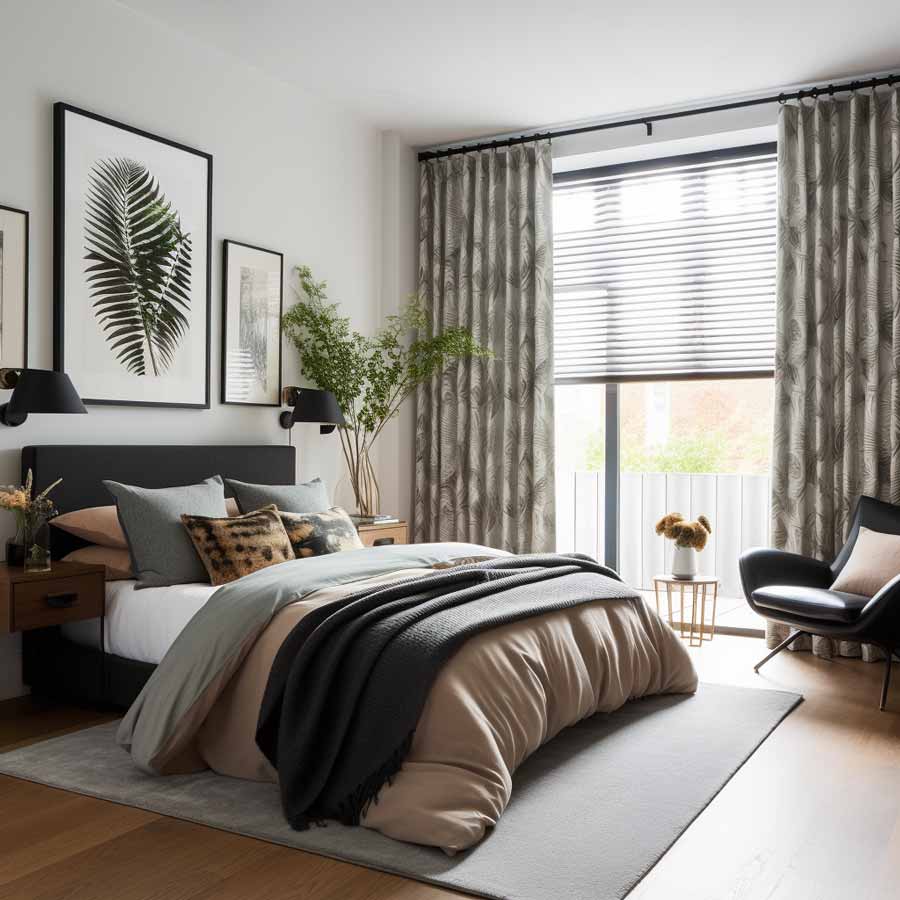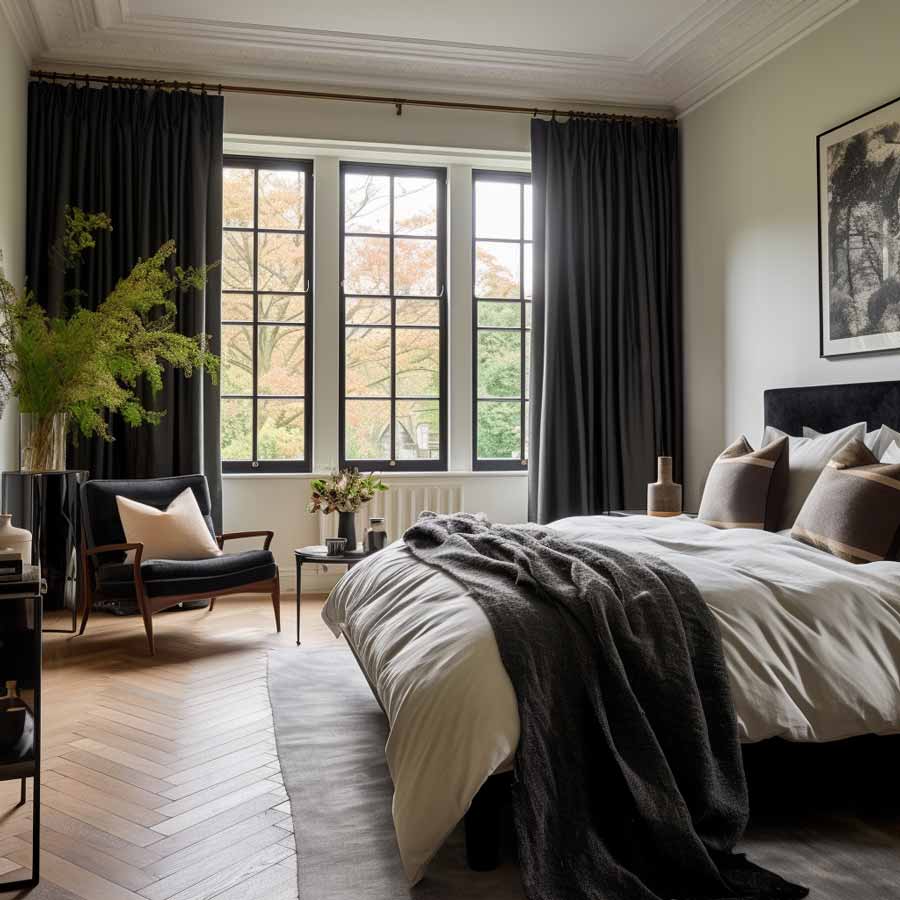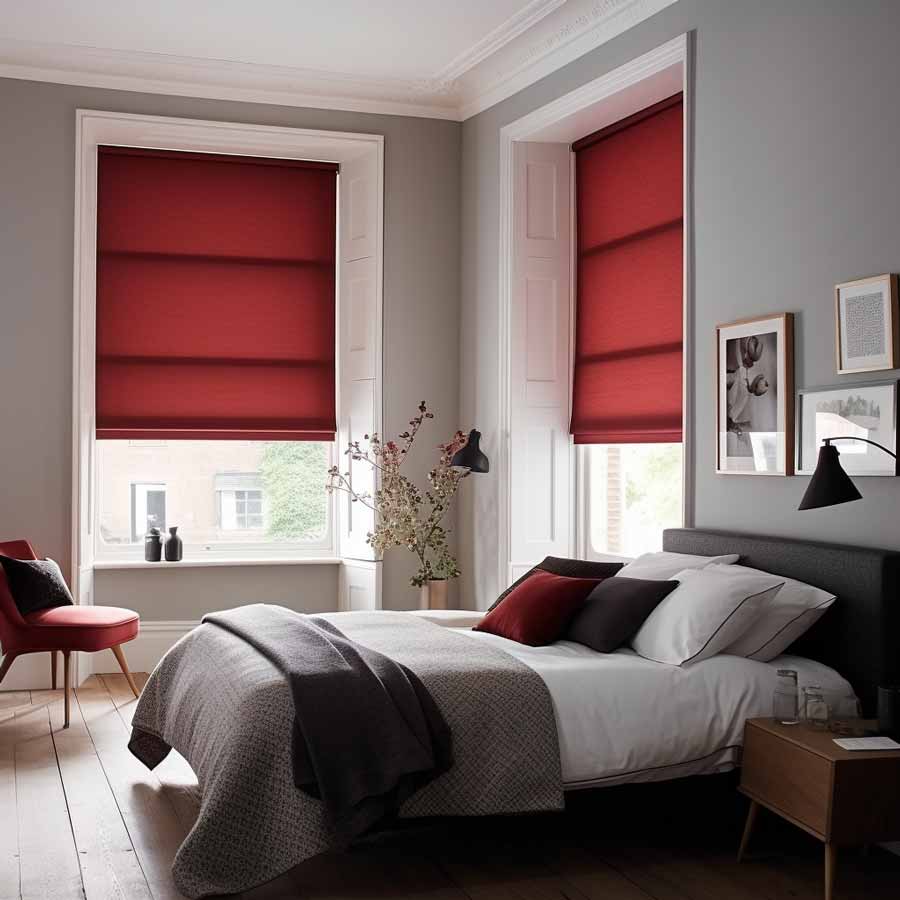Measuring & Fitting Included
Get an immediate price using our online estimator
Years’ of experience
Daytime, evening & weekend appointments
Curtains vs Blinds in Bedrooms: Choosing the Perfect Window Treatment

Curtains vs Blinds in Bedrooms – Introduction
Window treatments play a crucial role in enhancing the overall ambiance and functionality of a bedroom. When it comes to selecting the perfect window treatment, curtains and blinds are two popular options to consider. In this article, we will explore the pros and cons of curtains and blinds, factors to consider when making a choice, and ultimately guide readers in making an informed decision based on their specific needs.
The Pros and Cons of Curtains
Curtains offer several advantages as a window treatment option. Firstly, they provide versatility in design and style options, allowing homeowners to choose from a wide range of fabrics, patterns, and colors to match their bedroom decor. This variety of options ensures that homeowners can find curtains that perfectly complement the overall aesthetics of their bedroom. Additionally, curtains offer enhanced privacy and light control. They can be easily adjusted to block or allow sunlight into the room according to personal preference.
The ability to control the amount of light entering the room allows homeowners to create a desired atmosphere, whether it’s a bright and airy space or a cozy and dimly lit environment. Moreover, curtains excel in reducing external noise, creating a peaceful and serene atmosphere in the bedroom. The thick fabrics of curtains help to absorb sound waves, minimizing disturbances from outside sources such as traffic or neighbors.

However, curtains do have some drawbacks. One limitation is their relatively limited insulation properties compared to blinds. This may result in less effective temperature control and potential energy loss. During colder months, curtains may not provide as much insulation as blinds, allowing heat to escape through the windows. This can lead to higher energy consumption and increased heating costs. Furthermore, curtains require regular maintenance, including washing or dry cleaning, which can add to the overall upkeep of the bedroom.
Homeowners should consider the extra effort and cost involved in maintaining curtains when making their decision. Lastly, curtains have the tendency to collect dust and allergens over time, potentially causing discomfort for individuals with allergies or respiratory issues. Regular cleaning and dusting are necessary to keep curtains clean and allergen-free.

The Pros and Cons of Blinds
Blinds offer unique advantages when it comes to window treatments in bedrooms. They excel in providing superior light control and privacy options. With blinds, homeowners have the flexibility to adjust the slats or vanes to control the amount of light entering the room, ensuring a comfortable and tranquil ambiance. This precise control over lighting allows homeowners to create different moods throughout the day and maintain privacy as needed.
Additionally, blinds offer excellent insulation properties, effectively preventing heat loss during colder months and reducing energy consumption. The design of blinds, with their tight-fitting slats, helps to create a barrier between the window and the room, minimizing heat transfer. This can contribute to energy savings and a more comfortable bedroom environment. Moreover, blinds are easy to clean and maintain, as they can be simply wiped down with a damp cloth. Unlike curtains, which require washing or dry cleaning, blinds offer a convenient option for busy individuals.
Nevertheless, blinds have a few disadvantages that should be considered. Unlike curtains, blinds have limited design choices, with fewer options in terms of fabrics and patterns. Homeowners may find it challenging to find a blind that perfectly complements the bedroom decor. However, blinds come in a variety of materials such as wood, aluminum, or vinyl, each offering its unique aesthetic appeal. Additionally, some types of blinds may produce noise when operated, which could potentially disrupt sleep or relaxation. It is important to choose blinds that operate quietly to ensure a peaceful bedroom environment. Lastly, premium materials used in blinds can result in a higher initial cost compared to curtains, making them a less budget-friendly option for some homeowners. However, blinds are a long-term investment that can provide durability and functionality, justifying the higher upfront cost.
Factors to Consider When Choosing
When making a decision between curtains and blinds for bedroom window treatments, several factors should be taken into consideration. Firstly, the desired aesthetics and ambiance of the bedroom play a significant role. Curtains often add a soft and elegant touch, while blinds provide a sleek and contemporary look. Homeowners should consider their personal style and the overall theme of their bedroom when choosing between the two options. Secondly, privacy and light control preferences should be evaluated, as curtains and blinds offer different levels of flexibility in adjusting light and maintaining privacy. Curtains, with their ability to block out light completely, are a suitable choice for individuals who prioritize privacy and prefer a darker sleeping environment.
Blinds, on the other hand, allow for precise light control, making them ideal for those who prefer a balance between natural light and privacy. Additionally, energy efficiency and insulation needs should be considered, especially for individuals seeking to reduce energy consumption and maintain a comfortable temperature in the bedroom. Blinds generally offer better insulation properties compared to curtains, making them a suitable choice for energy-conscious homeowners.
Furthermore, the maintenance and cleaning convenience of the chosen window treatment should align with the homeowner’s lifestyle. If regular cleaning and maintenance are a concern, blinds may be a more practical choice due to their ease of cleaning. Lastly, budget constraints and long-term investment should be taken into account to ensure the chosen option is financially feasible. While blinds may have a higher upfront cost, they can provide long-term benefits in terms of durability and energy savings.
Making the Right Choice
To make the right choice, it is essential to assess individual bedroom requirements. Factors such as personal preferences, lifestyle, and specific needs should be considered. Homeowners should evaluate the desired aesthetics, privacy and light control preferences, energy efficiency requirements, and maintenance convenience. It may also be beneficial to explore hybrid options, such as combining curtains and blinds, to maximize the advantages of both treatments. For example, using blinds for light control and privacy during the day and combining them with curtains for added insulation and aesthetics during the night. Seeking professional advice and consultation can provide valuable insights and guidance, ensuring that the final decision aligns with the unique needs of the bedroom and the homeowner.
Curtain Vs Blinds In Bedrooms – Conclusion
In conclusion, choosing the perfect window treatment for a bedroom involves considering multiple factors and weighing the pros and cons of curtains and blinds. While curtains offer versatility in design and enhanced privacy, blinds excel in light control and insulation properties. By assessing individual needs, preferences, and budget constraints, homeowners can make an informed decision that strikes a balance between aesthetics, functionality, and practicality. Ultimately, the chosen window treatment should enhance the overall atmosphere of the bedroom, creating a comfortable and relaxing space for rest and rejuvenation.
Our aim is to give people looking for fitted blinds in the locality the best possible service and after sales care together with an exceptional quality product at the absolute best prices available. Custom Fitted Blinds are an independent blinds company, we source our products from some of the UK’s best and biggest national companies to make sure our customers get the best window treatments on the market. If you’re looking for fitted blinds, please try our price estimator to give you a pre-appointment, ‘supplied and fitted’ quotation.
Create a home you'll love
Blinds Range
Shutters Range
Important Links
© 2024 All rights reserved
Made with ❤ with Elementor
